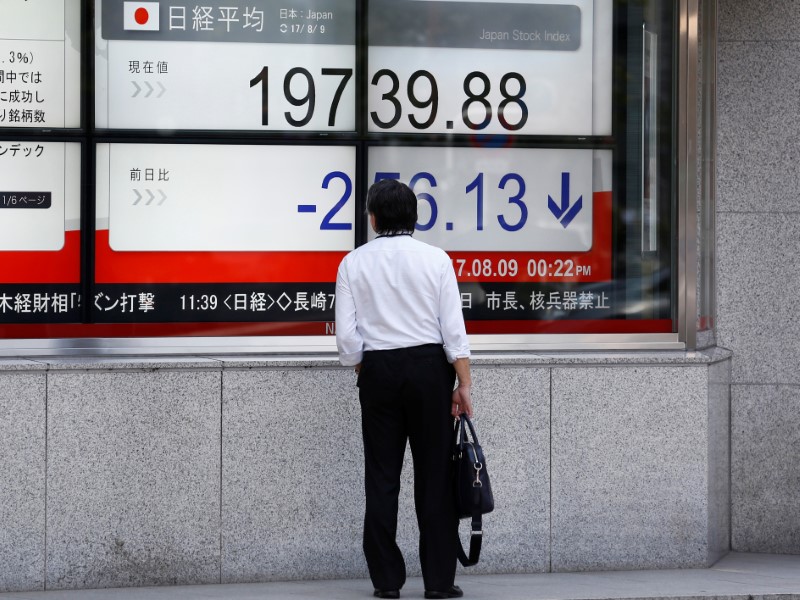By Nichola Saminather
SINGAPORE (Reuters) - Asian equity markets extended a global slide on Friday as tensions ramped up between the United States and North Korea, sending investors fleeing to less risky assets such the yen, the Swiss franc and U.S. Treasuries.
Wall Street closed sharply lower after U.S. President Donald Trump issued a new round of fiery rhetoric, warning Pyongyang against attacking Guam or U.S. allies after it disclosed plans to fire missiles over Japan to land near the U.S. Pacific territory.
MSCI's broadest index of Asia-Pacific shares outside Japan (MIAPJ0000PUS) skidded 1.4 percent in its third session of declines to a near one-month low, heading for a 2.1 percent drop for the week.
Australian shares (AXJO) were down 1.3 percent, set for a weekly loss of 0.5 percent. Japanese markets were closed for a holiday.
"What has changed this time is that the scary threats and war of words between the U.S. and North Korea have intensified to the point that markets can't ignore it," said Shane Oliver, head of investment strategy at AMP Capital in Sydney.
"Of course it's all come at a time when share markets are due for a correction so North Korea has provided a perfect trigger."
Many markets have climbed to record or multi-year highs, leaving them vulnerable to a sell-off.
Trump took specific aim at North Korean leader Kim Jong Un on Thursday, saying he had "disrespected our country greatly" and would not be "getting away with it."
South Korea's KOSPI (KS11) fell 1.8 percent to a 9 1/2-week low, taking its losses this week to nearly 2.7 percent.
The Korean won
Chinese bluechips (CSI300) lost 0.9 percent, while Hong Kong's Hang Seng (HSI) was 1.6 percent lower.
If North Korea launches an attack that threatens the United States then China should stay neutral, but if the United States attacks first and tries to overthrow North Korea's government China will stop them, a Chinese state-run newspaper said on Friday.
"This situation is beginning to develop into this generation's Cuban Missile crisis moment, with recent leaked intelligence reports alleging that North Korea now has miniaturised its nuclear warheads, which extends the range of its missiles, and potentially brings U.S. targets into reach," ING's chief Asia economist Robert Carnell said in a research note on Friday.
"While the U.S. President insists on ramping up the war of words, there is a decreasing chance of any diplomatic solution," Carnell said.
Trump's threat earlier this week, to unleash "fire and fury" on Pyongyang if it attacked, was ultimately dismissed as bluster by many investors.
Trump's second warning, however, has shaken markets that have been largely resilient this year, swatting away a slew of risks. These have ranged from an investigation into Russia's possible interference in the 2016 U.S. presidential election, to concerns about China's risky debt levels, to stubbornly low inflation in the U.S.
The CBOE Volatility Index (VIX), the most widely followed barometer of expected near-term U.S. stock market volatility, rose the most in about 12 weeks. The index closed at 16.04 overnight, the highest level since Nov. 8, when Trump was elected president.
The Chinese volatility gauge (VXFXI) jumped by the most since January 2016. It was at its highest level in more than seven months.
On Wall Street overnight, the Nasdaq (IXIC) retreated 2.1 percent, while the S&P 500 (SPX) was down 1.4 percent, and the Dow Jones Industrial Average (DJI) pulled back 0.9 percent. (N)
U.S. stock futures (ESc1) were 0.1 percent lower on Friday.
The MSCI World index (MIWD00000PUS) slipped 0.1 percent, extending Thursday's 1.1 percent drop, its biggest one-day slide since May 17, hurt by the escalating U.S.-North Korea tensions.
The dollar extended losses against the yen to hit a new two-month low. It was down 0.2 percent at 108.96 yen
The yen is perceived as a safe haven because Japan is the world's biggest creditor country and investors there have tended to repatriate funds in times of crisis.
Low U.S. Treasury yields are also weighing on the dollar. The yield on the benchmark 10-year Treasury (US10YT=RR) fell as low as 2.197 percent, its lowest level since June 28, before inching back to 2.201 percent.
The dollar pulled back 0.1 percent to $0.9635 Swiss francs
The dollar was steady against a basket of six major currencies (DXY) at 93.385 after falling 0.2 percent on Thursday, with disappointing U.S. inflation and jobs data adding to the greenback's woes.
U.S. producer prices unexpectedly fell in July, recording their biggest drop in nearly a year, while another set showed the number of Americans filing for unemployment benefits unexpectedly rose last week.
Markets are now focused on U.S. consumer price data for July, due later in the session.
Spot gold prices
U.S. crude futures (CLc1) extended losses from Thursday, when they tumbled 2 percent on fears of slowing demand and lingering concerns over a global oversupply.
They were down 0.7 percent at $48.24 per barrel, on track for a weekly loss of 2.7 percent.

Global benchmark Brent (LCOc1) lost 0.7 percent to $51.53, after Thursday's 1.5 percent drop. It is poised to end the week down 1.7 percent.